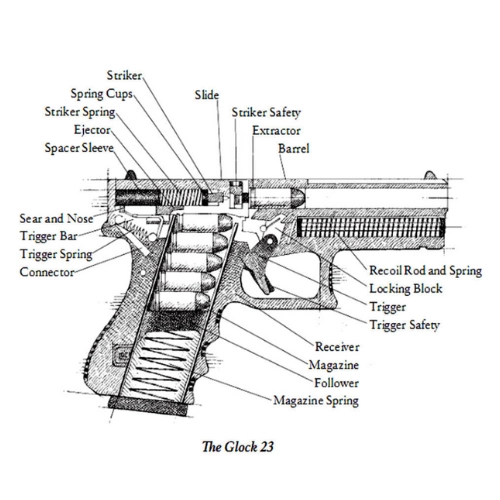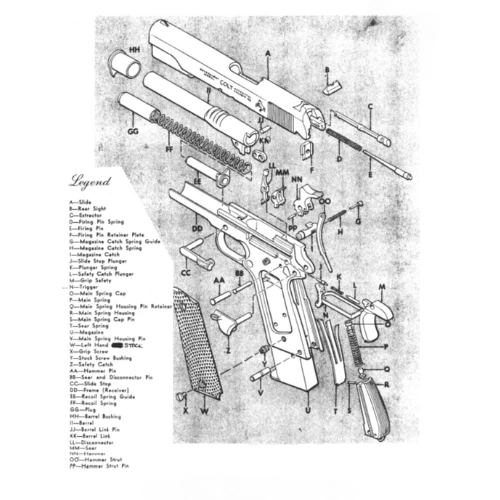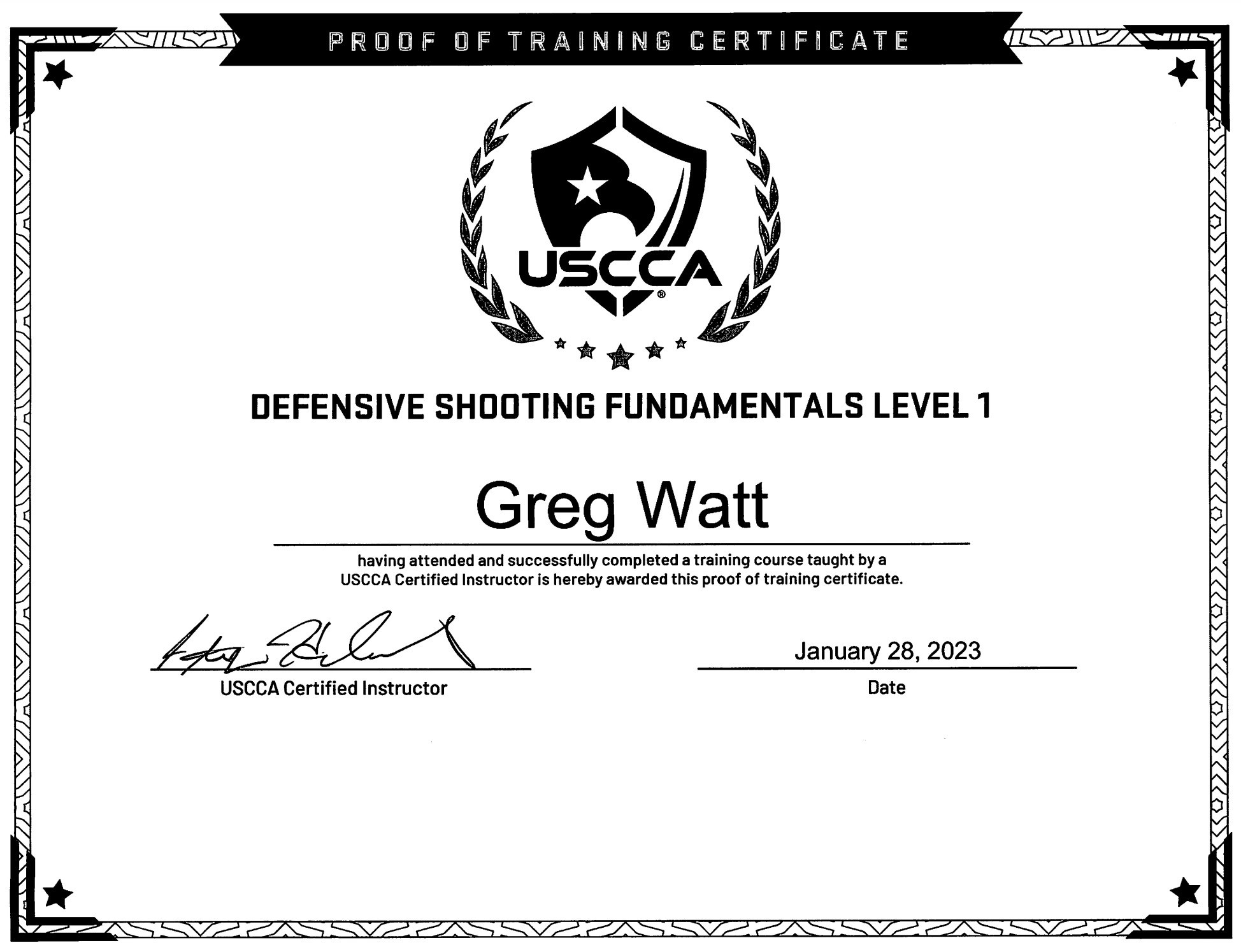Kansas City criminal defense lawyer Gregory Watt teaches a class at USCCA on gun laws and self-defense.
Gregory Watt gives an opinion to KSHB 41 News about the owner of SK Security accused of shooting a man.
Weapons Criminal Charges
The laws and consequences of weapons charges in Kansas and Missouri.The Second Amendment to the U.S. Constitution says, “[T]he right of the people to keep and bear Arms, shall not be infringed.”
Regardless of your interpretation of the second amendment, Prosecutors factor the presence of a gun into every charging decision they make. In other words, when guns are used in the commission of a crime or even present during the commission of a crime the stakes are high and the potential consequences, severe. If you are facing a weapons charge, The Watt Law Firm is here to defend you.
The Watt Law Firm deals with weapons charges daily. We appear in both Kansas and Missouri courts concerning very simple cases to the highly complex and our best defenses -- not surprisingly -- are Constitutional in nature. Whether it's self-defense, the right to bear arms, or the right to be free from unreasonable searches and seizures, we use the law to your advantage.
Another defense we frequently rely upon is showing the charge may have been brought based on an unjustifiable connection between you and the weapon. In short, hire an experienced attorney who knows exactly how to defend your interests.
Greg Watt has years of experience as both a prosecutor and defense attorney, therefore Greg can objectively and effectively review your case and plan accordingly. Do not let your rights be infringed. Contact The Watt Law Firm immediately to ensure you have the best by your side!


Weapons Charges in Kansas
Concealed Carry Laws
As of July 1, 2015, there are no permitting or training requirements for carrying a concealed firearm.
There are still exceptions where you can conceal carry.
it’s illegal to carry a firearm:
- into capitol buildings
- the governor’s home or grounds
- Any county courthouse (unless local authorities permit)
- Any state-owned buildings will signs clearly saying guns are prohibited
- Jail
- Polling place on Election Day
- School or College
- Mental Health centers
- Public Library
- Place of worship
All of the exceptions should have a warning sign posted clearly stating you may not carry a firearm on the premises.
Guns That Are Prohibited in Kansas Include:
- Shotguns with barrels less than 18 inches
- Automatic weapons
- Handgun cartridges with plastic-coated bullets with cores of less than 60% lead by weight
- Silencers
- Spring gun traps
Who Can’t Have Guns?
- Both addicted to and an unlawful user of a controlled substance.
- Mentally ill persons subject to involuntary commitment.
- A person convicted of felonies specified under the criminal possession of a firearm by a convicted felon statute can be denied gun ownership if they:
- have been convicted within the last 5 or 10 years, depending on the crime, the longer wait is generally for crimes against persons or non-person.
- crimes where the offender had a gun during the crime.
The Following Are Some of the Most Often Charged, Weapons Violations in the State of Kansas:
Criminal Use of Weapons involves three general types of acts:
- Possession, manufacture, or modification of weapons that are illegal in the State of Kansas;
- Possession of a firearm by, or transferring a firearm to a person not capable of properly handling it; or
- Possession of a firearm on school grounds.
A conviction for “Criminal Use” ranges anywhere from a class B misdemeanor (up to 6 months’ imprisonment) to a Severity Level 8, nonperson felony (minimum 9 months’ imprisonment).
(Kan. Stat. Ann. §§ 21-6301 & 21-6602)
Criminal Carrying of a Weapon is knowingly carrying 1) any weapon that is illegal in the State of Kansas or 2) any concealed weapon or firearm. This is a class A nonperson misdemeanor, which carries with is up to 1-year imprisonment. If the weapon is a short-barrel shotgun or an automatic firearm, the crime is a Severity Level 9, nonperson felony (minimum 7 months imprisonment).
(Kan. Stat. Ann. §§ 21-6302 & 21-6602)
Criminal Discharge of a Firearm means firing a gun at a building or vehicle, or while on public property. Depending on the circumstances (i.e. if people were nearby), this can range from a class C misdemeanor (up to one-month imprisonment) to a Severity Level 3, person felony (minimum of 89 months imprisonment).
(Kan. Stat. Ann. §§ 21-6308, 21-6308a, & 21-6602)
Finally, it is a crime for a person to be in possession of a firearm if he or she has previously been convicted of a person felony (Severity Level 8, nonperson felony: minimum 9 months’ imprisonment) or if under the influence (class A nonperson misdemeanor: up to one year in jail).
(Kan. Stat. Ann. §§ 21-6304, 21-6332, & 21-6602)
If you’re facing a weapons charge in Kansas, you need the best defense attorney you can find. Contact The Watt Law Firm here now to schedule a free consultation!
Weapons Charges in Missouri
Who May Not Own Firearms in the State of Missouri:
- Convicted of dangerous felony;
- Fugitive from justice, habitually intoxicated or drugged condition, or mentally incompetent;
- Under 21 yrs. old;
- Dishonorably discharged from armed services;
- MO resident for less than 6 mos.;
- Not citizen of U.S.
Firearms That Prohibited To Be Sold or Possessed Under Missouri and Federal Law, Include:
- Explosive weapons
- Gas guns
- Exploding bullets/projectiles
- Machine guns
- Short-barreled rifle or sawed-off shotgun
The Following Are Some of the Most Often Charged, Weapons Violations in the State of Missouri:
Class B Felony (5-15 years imprisonment)
Firing a gun from a vehicle, or at a person, vehicle, or building
(Class A felony if someone is injured or killed: a class A felony carries a range of punishment of 10-30 years or life imprisonment).
Class D Felony
Class E Felony
- Setting a gun trap (“spring gun”)
- Shooting into a home or vehicle
- Brandishing any weapon to one or more people
- Possession of both a firearm and a controlled substance (if the amount possessed is felonious).
Class A Misdemeanor
- Handling a firearm while intoxicated
- Carrying a gun into a school, school bus, or any other place sponsoring school activities
(If the gun is loaded during these acts, it is a class D felony.)
Class B Misdemeanor (Firing a gun within 100 yards of a school, court, or church)
- Firing a gun across a public road
- Carrying any weapon into a church, election precinct, or government building (See generally Missouri Revised Statutes, Title XXXVIII, Chapter 571)
If you are facing a weapons charge, don’t delay, be proactive, and contact The Watt Law Firm here today.
The Watt Law Firm takes great pride in the service we provide our clients. Please, visit our customer testimonials page for dozens of satisfied clients.
LEARN ABOUT YOUR LEGAL OPTIONS


